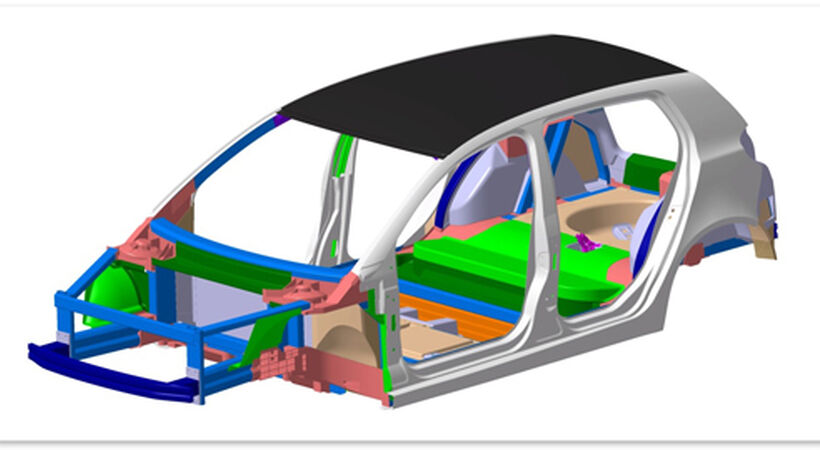With an aluminium-intensive concept, e-car bodies can become lighter than 200kg, according to a concept from Hydro.
All cars need to lose weight to reduce emissions in safe, reliable ways. This applies to e-cars in particular, due to their heavy battery components.
The interdisciplinary “Light E-Body” project has investigated several options to reduce car body weight from the 314 kg of a conservative concept in full steel. That project agreed on a multi-material concept with a 248 kg body.
Going beyond, Hydro and fka developed a full-aluminium car body that meets the benchmark on safety and stiffness, while reducing the weight to just 199kg.
Further potential lies in lighter aluminium doors, hoods and lids, saving another 37.5kg – and additional, secondary weight reduction is not even yet considered. The concept developers highlight the similar performance in crash simulation of the full-aluminium concept and the multi-material concept. The full-aluminium concept is well suited for large-scale production and comes at a reasonable cost as the supply is based on existing technology and plants.
“We are excited that our full-aluminium car body accomplishes a much higher weight reduction compared to the multi-material concept of the official Light-E-Body project. It conveys a splendid message to e-carmakers: efficient low-energy automobiles are possible, with state-of-the-art light metal that is also fully recyclable,” states Eike Brünger, new head of Hydro’s Automotive Product Area.
“Cooperation with the ika/fka experts was absolutely great,” says Henk-Jan Brinkman, Program Manager Automotive in Hydro's R&D centre in Bonn, Germany. This teamwork followed up on the outcome of the Light E-Body Project, which worked until 2014, co-funded by the Federal Ministry for Education and Research of Germany and comprising 15 partners from Automotive industry, suppliers and universities.
Hydro ranks among the leading suppliers of aluminium strip and sheet for carmaking and is currently boosting capacity for lightweight car body sheet to 200,000 tonnes per year by building a new, state-of-the-art facility at its Grevenbroich plant with an investment of €130 million. First products are to be produced and shipped in 2016.
Fka GmbH is an offspring from and partner to the renowned ika institute, which ranks among the leading institutions for automotive research with resources comprising around 450 experts and is part of RWTH Aachen University.








